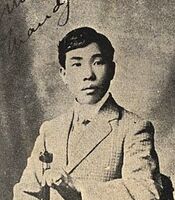Su Manshu
| PersonType | Category:Authors of Chinese Works Category:Translators |
|---|---|
| FirstName / namefirst | Su |
| LastName / namelast | Manshu |
| MainNamePhon | Su Manshu |
| MainNameTib | 蘇曼殊 |
| SortName | Manshu, Su |
| bio | Su Manshu (traditional Chinese: 蘇曼殊; simplified Chinese: 苏曼殊; pinyin: Sū Mànshū, 1884–1918) was a Chinese writer, poet, painter, revolutionist, and translator. His original name was Su Xuanying (Chinese: 蘇玄瑛; pinyin: Sū Xuányīng), Su had been named as a writer of poetry and romantic love stories in the history of early modern Chinese literature. But he was most commonly known as a Buddhist monk, a poetry monk, "the monk of sentiment" (pinyin: qing seng; simplified Chinese: 情僧), and "the revolutionary monk" (pinyin: gem-ing seng; simplified Chinese: 革命僧). Su was born out of wedlock in Yokohama, Japan in 1884. His father was a Cantonese merchant, and his mother was his father's Japanese maid. His ancestral home was in Zhongshan city, Guangdong Province, China. He died at the age of 34 due to a stomach disease in Shanghai.
Su had a good master of painting and language. He mastered many languages — English, French, Japanese and Sanskrit. In 1896, he went to Shanghai with his uncle and aunt to study in the British con-cession when he was thirteen years old. Later, in 1898, he went to Japan to study at the School of Universal Harmony (Da Tong School 大同學校) in Yokohama, Japan. In 1902, he continued to study in the special program for Chinese students at Waseda University ( 早稻田大學 ). He became a Buddhist monk three times during his life; once at the age of 12 in 1895, later in 1899, and again in 1903, and adopted Su Manshu as a Buddhist name. He studied in Japan and traveled to many Buddhist countries including India, and Java. In 1895, Su fell ill and nearly died due to neglect of care from his family, which resulted in him resorting Buddhism. However, Su did not follow the rules of Buddhism so he was expelled. In 1898, Su suffered a serious setback in his romantic relationship with a Japanese girl named Jingzi. Jinzi's family forced her to leave Su, but she could not bear the great pressure and soon died. After facing the suffering, Su resorted to Buddhism again as a spiritual consolation for a short period. In 1913, Su felt disappointed about the political and social status, which the Qing government perpetually banned anti-government remarks in the revolutionary newspaper. So he returned to the temple in Guangdong for the rest of his life. Su was the most famous prose translator and his masterworks include Selected poems of Byron and Les Miserables. In 1903, he serialized his incomplete translation of Les Miserable World in The China National Gazette (國民日日報) and then published it in 1904. Su also translated quite a few poems by foreign romantic poets from Lord Byron and then published a collection of the translations entitled Selected Poems of Byron (拜倫詩選) in 1908. In 1911, some of these translations were published again in an anthology entitled Chao Yin (Voice of the Tide). In 1911 or 1912, Su wrote and published his first as well as a most celebrated semi-autobiographical romance novel, Duan Hong Ling Yan Ji (The Lone Swan). (Source Accessed July 21, 2023) |
| YearBirth | 1884 |
| YearDeath | 1918 |
| BornIn | Yokohama, Japan |
| Other wikis |
If the page does not yet exist on the remote wiki, you can paste the tag |

